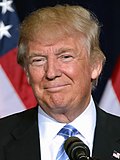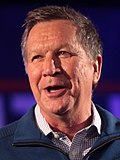| Poll source | Date | 1st | 2nd | 3rd | Other |
|---|
|
| Primary results [5] | March 15, 2016 | Donald Trump
40.84% | Ted Cruz
40.63% | John Kasich
10.10% | Marco Rubio 6.09%, Ben Carson 0.88%, Jeb Bush 0.36%, Mike Huckabee 0.23%, Rand Paul 0.19%, Chris Christie 0.18%, Rick Santorum 0.08%, Carly Fiorina 0.07% |
| Fort Hayes State University [6] Margin of error: ± 7%
Sample size: 208 | March 3–10, 2016 | Donald Trump
36% | Ted Cruz
29% | Marco Rubio
9% | John Kasich 8%, Other 1%, Undecided 17% |
| Remington Research Group [7] Margin of error: ± 2.6%
Sample size: 1,528 | December 18–19, 2015 | Donald Trump
33% | Ted Cruz
23% | Marco Rubio
12% | Ben Carson 8%, Jeb Bush 3%, Chris Christie 3%, Carly Fiorina 2%, Rand Paul 1%, John Kasich 1%, Undecided 14% |
| Public Policy Polling [8] Margin of error: 4.7%
Sample size: 440 | August 7–8, 2015 | Donald Trump
23% | Ben Carson
11% | Jeb Bush
11% | Mike Huckabee 10%, Ted Cruz 9%, Scott Walker 8%, Carly Fiorina 7%, Marco Rubio 6%, John Kasich 4%, Rand Paul 4%, Chris Christie 1%, Bobby Jindal 1%, Rick Perry 1%, Rick Santorum 1%, George Pataki 0%, Lindsey Graham 0%, Jim Gilmore 0%, Someone else/Undecided 2% |






